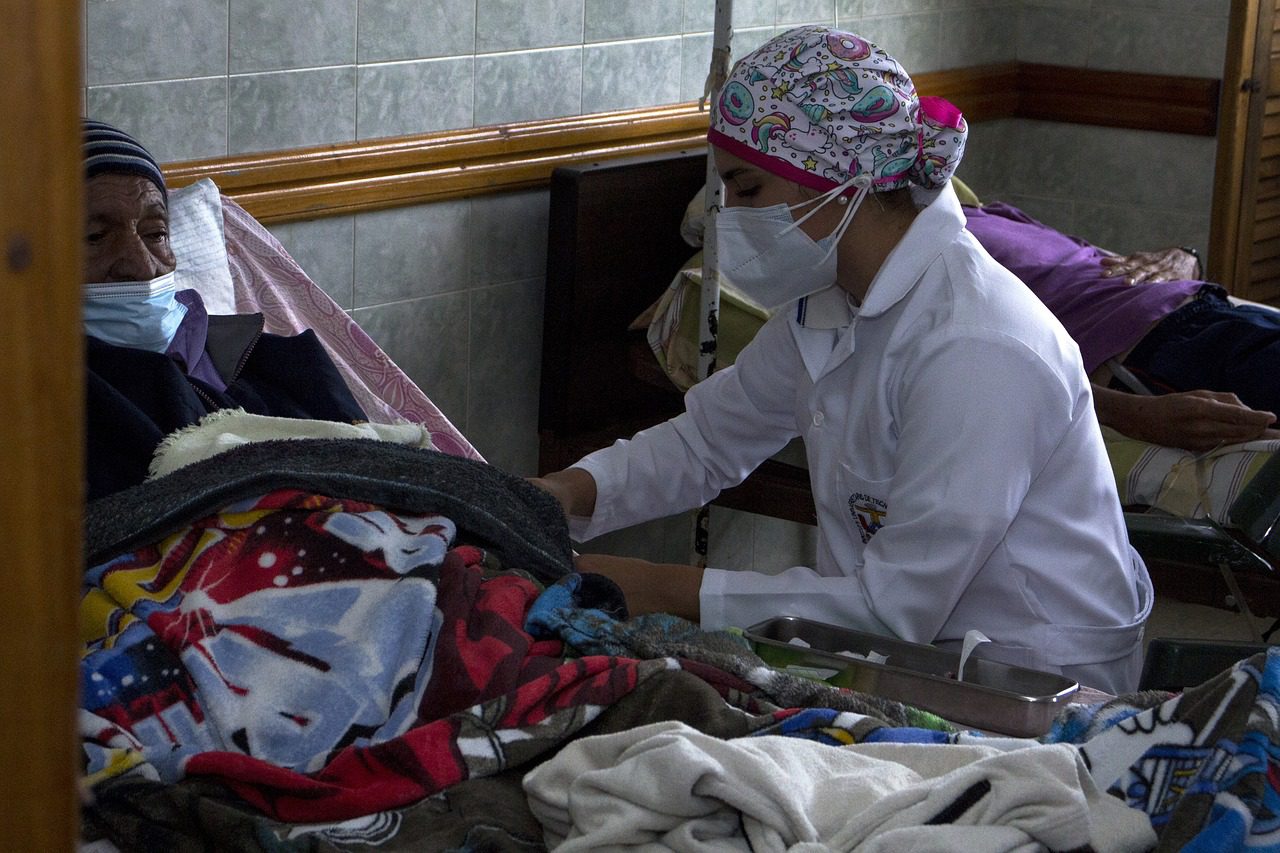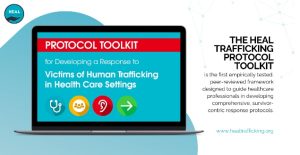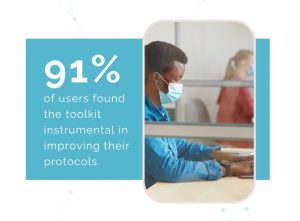
Developing a Response to Human Trafficking Victims in Health Care Settings
Guest blog authors: Lucy Mahaffey and Hanni Stoklosa of HEAL Trafficking.
Summary: The HEAL Trafficking Protocol Toolkit for Developing a Response to Human Trafficking Victims in Health Care Settings is the first peer-reviewed and empirically tested framework to guide protocol development to respond to trafficked persons in diverse health care settings. Recognized for its practicality and comprehensive approach, the toolkit not only informs but transforms the response to human trafficking, ensuring protocols are not only trauma-informed and survivor-informed but also conducive to advancing sustainability in institutional, human, and fiscal resources. To date, the toolkit has been used by more than 6,800 people in over 55 countries.
Trafficked persons seek healthcare during exploitation, but few health professionals know how to respond appropriately, and few institutions have protocols to guide this response. HEAL Trafficking, a public health nonprofit committed to healing the world of human trafficking, developed a way to guide this response and tested it. With subject-matter experts and Hope for Justice, they developed the HEAL Trafficking Protocol Toolkit. This toolkit aims to provide health care providers with the necessary guidance to respond effectively to trafficked persons. The toolkit was empirically evaluated to test its usability and effectiveness.
It is important to note that subject matter experts and reviewers included individuals with lived experiences of trafficking. Resilient Voices, the survivor caucus at the Coalition to Abolish Slavery and Trafficking, also met with the lead Toolkit author to discuss a draft and provide input.
The evaluation was conducted through a cross-sectional survey targeting users who had downloaded the toolkit between January 2017 and January 2018. The survey included both quantitative and qualitative analyses to gather a comprehensive understanding of the toolkit’s impact.
Who
From emergency rooms to private clinics, a diverse array of healthcare professionals now rely on our Protocol Toolkit. It’s not just a tool; it’s becoming a standard practice in enhancing the capacity of healthcare workers to offer informed and compassionate care to trafficking survivors. The respondents who participated in the survey were primarily those who had downloaded the HEAL Trafficking Protocol Toolkit. This included 1,020 individuals from the U.S. and 15 other countries. Of these, 179 participated in the survey, at a 17.5% response rate and 64.2% cooperation rate.
What
The HEAL Trafficking Protocol Toolkit is the first empirically tested, peer-reviewed framework designed to guide healthcare professionals in developing comprehensive, survivor-centric response protocols. The toolkit is intended to be used for educational purposes and to assist in creating trauma-informed, patient-centered protocols that can be sustained over time.
The Toolkit consists of four main sections:
- Introduction (describing the purpose of the Toolkit, expected benefits of human trafficking protocol use, and themes including integration of trauma-informed responses to patients experiencing violence)
- Steps for Protocol Development (identifying and engaging medical and non-medical internal and community stakeholders, creating and convening a protocol committee)
- Protocol Components (identifying patients at risk, interviewing, working with minors, etc.
- Moving Forward (education and training, distribution of protocol, monitoring and evaluation/quality improvement).

It complements existing resources, including the 2010 Framework for a Human Trafficking Protocol in Healthcare Settings from the National Human Trafficking Resource Center (NHTRC), by providing users step-by-step guidance in developing their own protocols. For example, while the NHTRC framework advises to “refer to local services as appropriate,” the HEAL Toolkit describes a wide variety of community stakeholders and service providers who can help meet survivors’ needs and provides tips on integrating them into the health care response.
“The toolkit is valuable because it presents the information I need in an organized fashion … Since we are starting from the beginning in developing our protocol, it is helpful to have things presented in a step-by-step manner. The Toolkit also includes a lot of valuable information and suggestions for resources that I had not considered.”
When
Evaluated over a full year, the toolkit has proven its effectiveness time and again. Its insights are continuously updated, ensuring it remains relevant and invaluable in the ever-evolving healthcare landscape. During the evaluation period, users who downloaded the toolkit were invited to participate in an electronic survey to share their experiences and feedback. The survey included 28 questions in multiple-choice, Likert scale, and open-ended formats. In addition, qualitative analysis was performed on responses from 40 participants who answered five open-ended questions on the Toolkit’s usefulness in protocol development and educational value.
 These included:
These included:
- How was the Toolkit most helpful in developing, implementing, or improving a human trafficking response protocol?
- How could the Toolkit have been more helpful?
- What was the most difficult aspect of developing your response protocol?
- How was the Toolkit most helpful in achieving your educational objective?
- How could the Toolkit have been more helpful in achieving your educational objective?
This quantitative and qualitative analysis revealed the Toolkit’s utility alongside 22 discrete themes. Toolkit authors minimized bias by involving other authors who did not develop the Toolkit and by highlighting all negative feedback from respondents.
Where
The study was conducted across various health care settings where the toolkit was downloaded and used. This includes hospitals, clinics, and other health care facilities where trafficked persons might seek care. Of survey responses, approximately 29.6% described themselves as registered nurses and 35.2% of respondents were based in hospitals. The survey respondents represented a wide range of geographic locations, indicating the toolkit’s broad reach and applicability. Most planned to use the Toolkit kit within the U.S., but 10.8% planned international use, including in Australia, Brazil, Canada, Central America, Indonesia, Israel, Iraq, Nigeria, Philippines, South America, the United Kingdom, and Vietnam.
Why
Addressing a vital need, the HEAL Trafficking Protocol Toolkit equips healthcare providers with the necessary tools to transform their care for trafficked individuals. Many health care providers lack the training and resources to identify and respond to trafficked persons effectively. The toolkit provides a structured approach to developing and implementing protocols that are trauma-informed and patient-centered. The ultimate goal is to improve the safety, health, and well-being of trafficked persons by ensuring they receive appropriate and compassionate care.
“HEAL’s toolkit was instrumental in developing our Anti-Human Trafficking Program at BCM; we have successfully screened nearly 600 patients in the last few years, 70% of whom were [being] trafficked.”
Findings
The feedback speaks volumes: 91% of users found the toolkit instrumental in improving their protocols. This is more than a statistic; it’s a testament to how the toolkit enhances the capabilities of healthcare providers to make a real difference in the lives of survivors.The qualitative analysis revealed 22 discrete themes highlighting the toolkit’s practicality, informativeness, and effectiveness in creating sustainable protocols.
Conclusion
Health care providers and institutions play a crucial role in responding to human trafficking. For significant organizational change to occur, investment from governments, funders, and health care institutions is essential. Shifting focus from law enforcement to health care and social services can yield significant benefits, including improved safety and health outcomes for trafficked persons. The HEAL Trafficking Protocol Toolkit represents a vital step forward in equipping health care providers with the tools they need to make a meaningful difference in the lives of trafficked individuals.
Cite: Baldwin SB, Miller CL, Maclin BJ, Williams S, Stoklosa H. Toward an Evidence-Based Framework to Guide Health Care Responses for Patients Impacted by Human Trafficking: Evaluation of the HEAL Trafficking Protocol Toolkit. Journal of Human Trafficking. 2023.
Hanni Stoklosa, MD, MPH, is co-founder and CMO of HEAL Trafficking, an emergency physician at Brigham and Women’s Hospital (BWH) with appointments at Harvard Medical School and the Harvard Humanitarian Initiative. Dr. Stoklosa is an internationally-recognized expert, advocate, researcher, and speaker on the wellbeing of trafficking survivors in the U.S. and internationally through a public health lens. She has advised the United Nations, International Organization for Migration, U.S. Department of Health and Human Services, U.S. Department of Labor, U.S. Department of State, and the National Academy of Medicine on issues of human trafficking and testified as an expert witness multiple times before the U.S. Congress. Moreover, she has conducted research on trafficking and persons facing the most significant social, economic, and health challenges in a diversity of settings including Australia, Brazil, China, Egypt, Guatemala, India, Liberia, Nepal, Kazakhstan, the Philippines, South Sudan, Taiwan, Thailand, and Uganda. Among other accolades, Dr. Stoklosa has been honored with the U.S. Department of Health and Human Services Office of Women’s Health Emerging Leader award, the Harvard Medical School Dean’s Faculty Community Service award, has been named as an Aspen Health Innovator and National Academy of Medicine Emerging Leader. Her anti-trafficking work has been featured by CNN, the New York Times, National Public Radio, Fortune, Glamour, Canadian Broadcasting Corporation, STAT News, and Marketplace. Dr. Stoklosa published the first textbook addressing the public health response to trafficking, “Human Trafficking Is a Public Health Issue, A Paradigm Expansion in the United States.”
Lucy Mahaffey has focused on trafficking since 2009. She conducted two statewide studies on trafficking in Oklahoma from 2019-2023. First, she led a 102-page deep dive on Oklahoma’s response to trafficking (Mapping Oklahoma’s Response to Human Trafficking: Data & Partnerships). Then, while at the University of Cambridge, she led an 86-page study on survivors’ expertise, including surveys and interviews with Oklahoman trafficking survivors and victim services providers on what Oklahoma gets right and wrong (Rethinking Oklahoma Organizations’ Response to Human Trafficking: Centering Survivor Voices). Her work is fully funded by the UK government through the prestigious Marshall Scholarship. She got her undergraduate at OU, where she founded a statewide trafficking curriculum for students and OU’s trafficking conference. Her speaking engagements include conferences across the UK and US, most notably the national US Dept of Homeland Security and Dept of Education’s Stakeholder Conference in D.C. and she has developed a policy brief for the US Dept of State on human trafficking, due process, and criminal systems.
